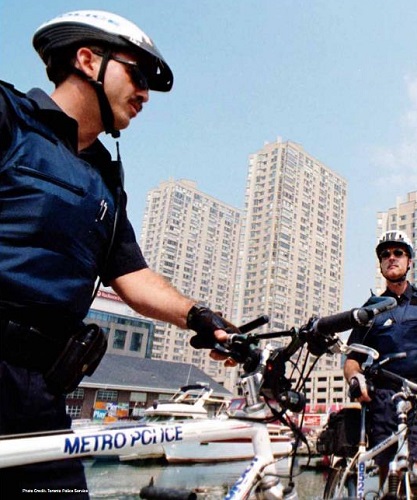The Toronto Police Services (TPS) is looking into a number of sweeping changes geared at modernizing the forces, and this could be an excellent business opportunity for Canadian technology vendors.
The way forward: Modernizing Community Safety in Toronto, is a 47-paged interim report that outlines 24-key recommendations of the TPS in order to help the forces achieve three main goals 1) focusing policing on where it is most needed, 2) embracing partnerships to create a safer community, and 3) addressing the complex policing needs of Toronto.
The 24 recommendations in the interim report encompasses a broad range of changes which include items such as overhauling the Paid Duty process, disbanding transit patrol, realigning the divisional boundaries of the service, and others. However, the portions relating to what the TPS calls “connected officers” as well as plans to roll out mobile technology, upgrade data collection and analysis, improve big data capabilities, and upgrade communication capabilities, would be of interest to many technology and communications companies.
Cheryl McNeil, public safety operations planner for the TPS, said the service and its Transformational Task Force is hosting a one day consultation event in Toronto on October 5 in order to get feedback from the technology vendor partner community.
The sessions will take place at the Toronto Police College, 70 Birmingham Street, Toronto. All costs incurred by participants in this consultation day must be borne by themselves. No payment will be made by the Transformational Task Force, the Toronto Police Service, or the Toronto Police Services Board.
Early this year, the TPS and TTF worked o the development of the recommendations, now they are in the consultation part of the strategy, McNeill said in an interview with Kevin Wennekes, chief business officer of Canadian Advanced Technology Alliance (CATA Alliance).
RELATED CONTENT
DND, RCMP operations impacted by faulty IT service
Police chiefs’ password resolution called unconstitutional
“We want to know from the community if these recommendations and goals make sense,” she said. “We want to know if we are on the right track.”
Here are some of the recommendations of the TPS and TTF that might be of interest to vendors:
Connected officers
The service is looking to transition from mobile workstations in vehicles to smart devices carried by all officers. This will include a full application suite and e-notebook, as well as updating existing applications to a mobile environment and allowing officers to be connected at all times to the most current operational information. The next steps will include research, analysis of best practices, assessing network opportunities, and developing and costing different options, leading to purchase decisions and implementation in 2019.
Data analysis, big data
The TPS wants to support the new service delivery model with a beefed up capacity to collect, measure, and evaluate data from a wide range of internal and external sources, including an improved capacity to model demand and workload as well as analytics of large complex data sets.
Non-emergency reporting and response
This would entail the use of alternative ways for people to report non-emergency situations such as where an immediate officer response is not necessary for personal safety, or to meet an immediate investigative need, including. The TPS is looking into on-line, digital, and by-phone reporting tools for low-risk incidents with civilian reporting and intake personnel available by appointment at police stations.
Traffic cameras technology to improve community safety
The use of cameras that are owned and operated by the City of Toronto, in school zones and areas identified as having higher collision rates, as a way of modifying driver behaviour and reducing risks. The Service will provide collision and enforcement-related data to inform where the cameras should be located.
More accessible and transparent information and services
Investment in modern technology to offer the public open access to information and tools that communities can use to improve neighbourhood safety, including. This includes a public safety data portal to encourage the creation and use of open data for public safety in Toronto; alternative means of speaking with officers such as video calling, and social media; enhancing the TPS app to connect with a mobile-connected officer; and enhancing real-time data collection and metrics.
Shared services delivery for court services and parking enforcement
The TPS wants an assessment of the possibilities around cost reduction through shared services between the TPS, court services; parking enforcement unit; and background screening related to the TPS hiring process.
911 enhancement
Assessments on future investment in improving the 911 technology allowing the Service to receive text messages, photos, videos, and better location information.
The TPS also wants an assessment of information technology requirements and is recommending the retention of an external expert advisor to review potentials for efficiency, alternative service delivery models and future trends for IT in policing.

